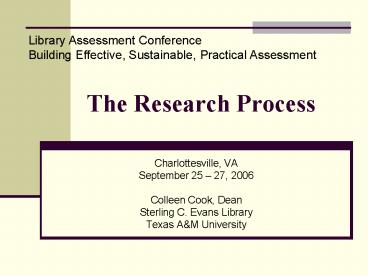The Research Process - PowerPoint PPT Presentation
1 / 15
Title:
The Research Process
Description:
Building Effective, Sustainable, Practical Assessment. 1: The Researcher as a Multicultural Subject. History ... Excerpted from Skipper, 1989. Grounded Theory: ... – PowerPoint PPT presentation
Number of Views:48
Avg rating:3.0/5.0
Title: The Research Process
1
The Research Process
Library Assessment Conference Building Effective,
Sustainable, Practical Assessment
- Charlottesville, VA
- September 25 27, 2006
- Colleen Cook, Dean
- Sterling C. Evans Library
- Texas AM University
2
1 The Researcher as a Multicultural Subject
- History and research traditions
- Conceptions of self and the other
- Ethics and politics of research
3
2 Theoretical Paradigms and Perspectives
- positivism, postpositivism
- interpretivism, constructivism, hermeneutics
- Feminism
- racialized discourses
- critical theory and Marxist models
- cultural studies models
- queer theory
4
3 Research Strategies
- study design
- case study
- ethnography, participant observation, performance
ethnography - phenomenology, ethnomethodology
- grounded theory
- life history, testimonio
- historical method
- action and applied research
- clinical research
5
4 Methods of Collection and Analysis
- interviewing
- observing
- artifacts, documents, and records
- visual methods
- autoethnography
- data management methods
- computer-assisted analysis
- textual analysis
- focus groups
- applied ethnography
6
5 The Art, Practices, and Politics of
Interpretation and Presentation
- criteria for judging adequacy
- practices and politics of interpretation
- writing as interpretation
- policy analysis
- evaluation traditions
- applied research
- (Denzin Lincoln, 2000, p.20)
7
Establishing Trustworthiness A Comparisonof
Conventional and Naturalistic Inquiry
Adapted from Lincoln Guba, 1985.
8
Summary of Techniques forEstablishing
Trustworthiness
9
Summary of Techniques forEstablishing
Trustworthiness (continued)
Adapted from Lincoln Guba, 1985.
10
The Audit Trail
Excerpted from Skipper, 1989.
11
Grounded Theory
- The aim of grounded theory is to generate or
discover a theory. - The researcher has to set aside theoretical ideas
to allow a substantive theory to emerge. - Theory focuses on how individuals interact in
relation to the phenomenon under study.
12
Grounded Theory
- Theory asserts a plausible relation between
concepts and sets of concepts. - Theory is derived from data acquired through
fieldwork interviews, observations and documents. - Data analysis is systematic and begins as soon as
data is available.
13
Grounded Theory
- Data analysis proceeds through identifying
categories and connecting them. - Further data collection (or sampling) is based on
emerging concepts. - These concepts are developed through constant
comparison with additional data.
14
Grounded Theory
- Data collection can stop when new
conceptualisations emerge. - Data analysis proceeds from open coding
(identifying categories, properties and
dimension) through axial coding (examining
conditions, strategies and consequences) to
selective coding around an emerging storyline. - The resulting theory can be reported in a
narrative framework or as a set of propositions
(Dey, 1999, pp.1-2).
15
The End
woof































